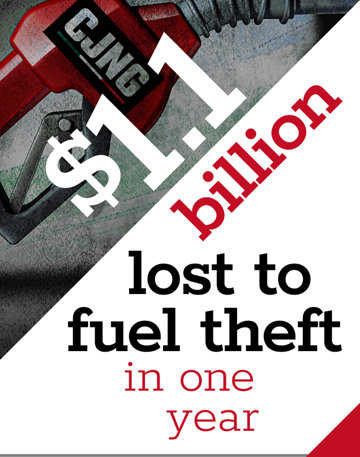In fact, like many business enterprises, they’ve begun diversifying their revenue streams.
Now they’re stealing oil, too.
Mexico, through its government monopoly Petróleos Mexicanos (Pemex), drills and extracts large quantities of oil, but lacks the capacity to refine lower quality crude oil into gasoline. That’s where the cartels step in.
When you fill up your car at the local gas station, you have no way of knowing whether the money you pay is enriching Mexican cartel members.
“In recent years, fuel theft in Mexico, including crude oil smuggling, has become the most significant non-drug illicit revenue source for the cartels and enables them to sustain their global criminal enterprises and drug trafficking operations into the United States,” the US Department of the Treasury’s Financial Crimes Enforcement Network warns.
And sometimes, it’s a family affair.
The Morfin brothers, a trio of narco-terrorists in Mexico, belong to the Cártel de Jalisco Nueva Generación (CJNG). Along with their fentanyl manufacturing and smuggling enterprise, they’ve recently emerged as top dogs in the stealing, smuggling and selling of crude oil.
Headed by kingpin criminal Cesar Morfin Morfin, also known as Primito, the trio includes his older brother, Alvaro Noe Morfin Morfin, and younger brother, Remigio Morfin Morfin.
“Primito is involved in the transportation, importation and distribution of narcotics, including fentanyl, heroin, methamphetamine, cocaine and marijuana, into the United States,” the Treasury Department said. “He has also been known to import fentanyl and methamphetamine precursor chemicals sourced from China.”
Crude oil thievery is now a crime so common there is a name for it—huachicol—and those involved are dubbed huachicoleros.
It is a costly crime: In 2022 alone, Pemex reported losses of $1.1 billion to fuel theft. It is also a widespread crime. In 2023 alone, some 5,600 illegal pipeline taps were found in Mexico.
Cartels steal oil either by using corrupt Pemex employees—who divert the oil to trucks controlled by the Morfins—or by illicitly tapping into Pemex pipelines.
Cartels then smuggle the stolen oil into the US in trucks often marked “waste oil,” or “hazardous materials,” cross the border using forged certificates—fake authorizations from the Mexican government to export the oil—and then sell it at a steep discount to corrupt US refiners and exporters who, in turn, refine it and resell it on the world market.
And just like buying drugs, when you buy oil, you never really know what you’re getting. In fact, when you fill up your car at the local gas station, you have no way of knowing whether the money you pay is enriching Mexican cartel members like the Morfins.
“Fuel theft and crude oil smuggling are cash cows for CJNG’s narco-terrorist enterprise, providing a lucrative revenue stream for the group and enabling it to wreak havoc in Mexico and the United States,” Secretary of the Treasury Scott Bessent said.

“According to US law enforcement authorities, the cartels are using complicit Mexican brokers in the oil and natural gas industry to smuggle and sell crude oil stolen from Mexico’s Petróleos Mexicanos to complicit, small US-based oil and natural gas companies operating near the US southwest border,” a Financial Crimes Enforcement Network release said. “As part of these schemes, the cartels are stealing billions of dollars of crude oil, fueling rampant violence and corruption across Mexico, and undercutting legitimate oil and natural gas companies in the United States.”
The Morfins and the CJNG control their home areas through terror, often running a “protection racket” against anyone trying to muscle in on their oil-smuggling operations.
Lawmakers say the cartels are even charging legitimate fuel carriers a “tax” for driving through cartel “turf”—in effect running their own private turnpikes, enforced by brutal violence.
In 2023, cartel gunmen reportedly forced drivers of a dozen oil tanker trucks to dump their loads in the border town of Matamoros, south of Brownsville, Texas.
“This is going to happen to all the ‘grasshoppers,’” a man says on a video the criminals took of the event, using a slang term for drivers who try to “jump” past the gang’s territory without paying protection.
US Rep. Vicente Gonzalez sent a letter in 2023 to US Trade Representative Katherine Tai stating: “This brazen criminal act severely undermines longstanding trade agreements which are vital for the econoic growth of communities along the border. Trade deals like the United States-Mexico-Canada Agreement (USMCA) were set in place to ensure that goods continue to flow freely between our ... countries, unimpeded by criminals who want nothing more than to line their own pockets at the expense of our businesses and citizens.
“The Government of Mexico and the US Government must act quickly to protect shipments of fuel and other goods into Mexico and halt the cartels’ brazen actions as they continue to jeopardize our existing trade agreement.”
The US has designated the CJNG a Foreign Terrorist Organization.
In early May, the Treasury Department’s Office of Foreign Assets Control sanctioned the three Morfin brothers. OFAC also sanctioned two Mexico-based trucking companies, Servicios Logisticos Ambientales and Grupo Jala Logistica, for transporting oil for the Morfins.






















